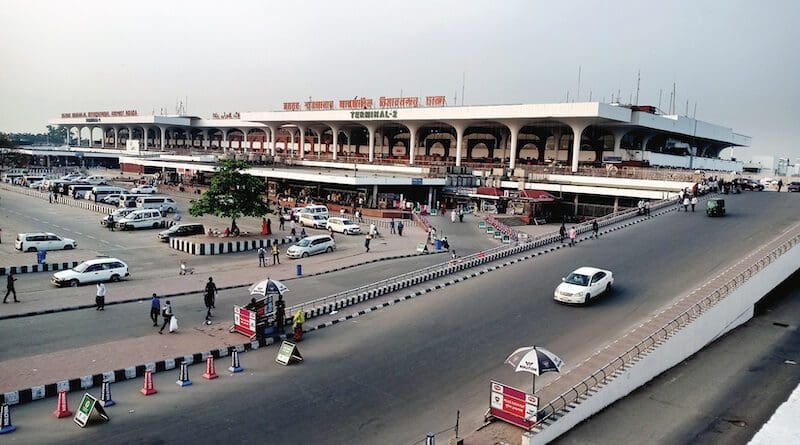Syed Raiyan Amir

In a significant move towards fortifying bilateral ties, Bangladesh and Japan inked an agreement on December 24, 2023, marking Japan’s commitment to supporting Bangladesh’s development endeavors. The accord involves a substantial loan of $540 million allocated for the ongoing construction of the third terminal at Hazrat Shahjalal International Airport, along with a cargo terminal and associated facilities. This financial infusion is part of the third tranche of Japanese loans dedicated to the comprehensive airport expansion project, totaling a substantial $2.21 billion.
The terms of the loan, as disclosed by the Japanese embassy in Dhaka, are characterized by an interest rate of 1.30 percent. The repayment schedule spans 20 years, commencing after a grace period of 10 years. The official signing of the agreement transpired in Dhaka, featuring the participation of IWAMA Kiminori, the Japanese ambassador to Bangladesh, and Shahriar Kader Siddiky, the secretary to the Economic Relations Division.
The genesis of this financial collaboration traces back to December 2019, with the airport expansion project estimated to incur a total cost of Tk 21,300 crore. Of this financial outlay, Tk 15,000 crore originates from the Japan International Cooperation Agency (JICA), while the remainder is shouldered by the Bangladesh government.
Prime Minister Sheikh Hasina inaugurated the terminal partially on October 7, underscoring its strategic importance. Although operational use by airlines is anticipated in the near future, the overarching objective of the project is to address the escalating demand in aviation. This entails expanding airport capacity, enhancing accessibility, and bolstering security measures—a collective effort that is poised to make substantial contributions to Bangladesh’s economic growth.
In alignment with these goals, the expanded airport is projected to play a pivotal role in augmenting regional connectivity. This, as articulated in the official statement, aligns with Japan’s unwavering dedication to supporting Bangladesh’s development through a strategic partnership aimed at fostering mutual prosperity.
The Civil Aviation Authority of Bangladesh (CAAB) has outlined the anticipated features of the new terminal, indicating its capacity to accommodate 37 aircraft and host 26 boarding bridges. Currently, the airport’s two existing terminals facilitate the operations of 33 airlines, managing the takeoff and landing of 120-130 airplanes. On a daily basis, these terminals serve approximately 30,000 to 35,000 passengers, with an annual throughput of around 8 million passengers.
Upon the completion and full operation of the third terminal, an additional 12 million passengers can be accommodated annually. This expansion is complemented by a robust infrastructure, including 59 counters for arrivals (including five automated ones) to expedite passenger services. For departures, the terminal is equipped with 115 check-in counters, of which 15 are self-service counters. Additionally, 66 departure immigration counters, featuring 10 automatic passport control counters, aim to enhance the efficiency of the departure process.
The comprehensive approach to infrastructure development also extends to ancillary facilities, with a multi-storey car parking structure in the terminal’s construction pipeline. This parking facility is poised to accommodate a substantial 1,044 cars, catering to the burgeoning demands of an expanding airport.
Japan’s financial commitment to the Hazrat Shahjalal International Airport expansion project stands as a testament to the enduring partnership between the two nations. Beyond the monetary aspect, this collaboration underscores the shared vision of promoting economic growth, regional connectivity, and the overall advancement of Bangladesh’s aviation sector. The strategic infusion of funds aligns with Japan’s dedicated role as a reliable partner in Bangladesh’s journey towards development, encapsulating a narrative of cooperation, mutual benefit, and shared prosperity.
No comments:
Post a Comment